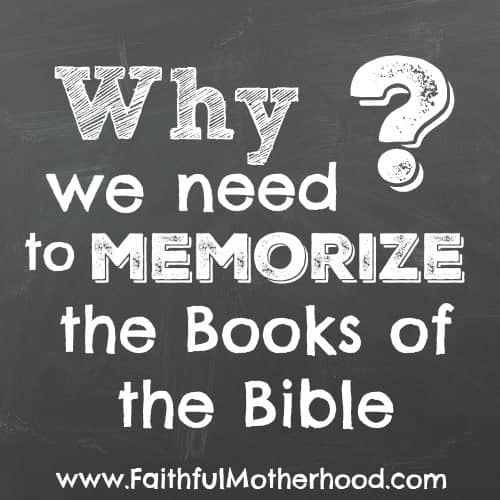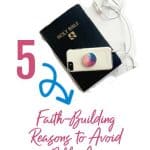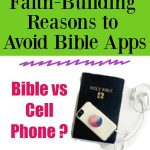The students have gathered for Wednesday night small group at church. It is time for Bible study and the leader asks everyone to get out their Bibles. Bible vs Cell Phone – which do you pull out?
There is no movement to go grab a stack of Bible and pass them out. There is no contest to see who can flip to the right page the fastest.
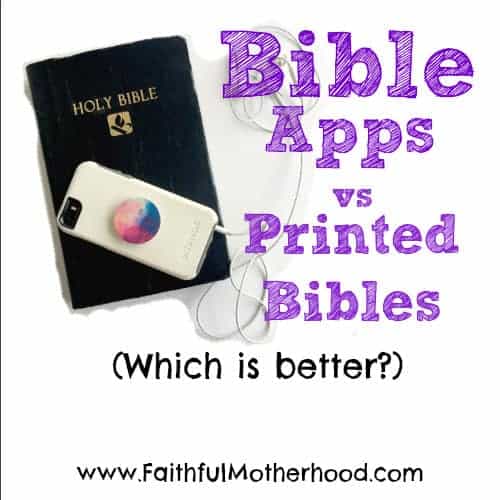
Instead, almost every student whips out a cell phone and opens their respective Bible apps.
Houston, we have a problem! Actually two problems.
One, that they almost all have phones. There are some serious issues to consider with safeguarding our children in the age of the smartphone.
Two, that we are relying on smartphones to study God’s word rather than a Bible that we can truly hold in our hands. Parents, have your child put away the Bible app, and pick up their Bibles.
Bible vs Cell Phone Issue #1- Teens Aren’t Paying Attention
The Bible app was pulled up, but they aren’t staying on it. The words are scanned rapidly and then they move on to other things.
The leader is still talking about the passage and trying to engage the children in conversation. Yet, the students are looking at text messages, snap chat, and Instagram.
We pick up our smartphones with the intent of looking at something and then we are distracted. A quick task becomes a long fall down a rabbit hole.
The reality is that most of us are addicted to our phones. Students and parents get lost in scrolling through Instagram or Facebook.
In studying scripture, we need to be present in that moment. The Devil wants us to be distracted. Choosing a print Bible helps to keep the reader focused.
Bible vs Cell Phone – Issue #2 Is Reading the Bible on a Cell Phone as Effective?
The research shows that Bible apps are not as effective as a physical Bible.
Study after study shows that we read differently on an electronic device versus a printed book. Reading an electronic device is fine for scanning information.
The problem comes when you are reading for comprehension. If you want to study something or think deeply about it, reading that text on a printed page makes a big difference.
We don’t want to scan the Bible, we must study the Bible. If reading comprehension is a priority, reading a Bible in printed format is foundational to that goal!
Readers that read print material read slower than with electronic text. When we read electronically, we tend to scan rather than to read each word.
As Christians, we need to soak up the Word. Reading slowly is key to not only reading comprehension, as noted above but also to allowing time for God to speak to us in His word.

Cell Phone vs Bible App Debate #3 – Biblical Literacy
Need to find something on a Bible app, just use the search function. You don’t have to have memorized the books of the Bible.
You don’t even need to know if the book you are searching for is in the Old Testament or the New Testament. Enter in your verses and they just pop up on the screen.
The experience of using a print Bible is much different. Yes, it is harder to use if you don’t know the basics. You have to use a table of contents to find the book you are looking for if you don’t have the books memorized.
However, once you have located your passage there is a lot more information to help you understand the passage.
A print Bible has headings to highlight what is going on. There are verses ahead of and behind the passage that you are studying.
Wise students do not just look at a few verses and base their opinions on those. This is called proof-texting, and it is a bad thing. It tends to confirm what we want the Bible to say rather than what the Bible as a whole is telling us.
We need to know the stories that come before and after. The writers of the Bible aren’t just piecing some random stories together. They are making an argument for what they want us to understand about Jesus.
The notes of a print Study Bible are invaluable. The biggest stumbling blocks to a daily personal study of the Bible by most Christians are understanding what they read and getting started. (Read my article about that below.)
Bible apps may help with reading plans and accountability through tracking, but most do not have the in-depth Bible notes & other resources found in a decent Study Bible.
Bible App Challenge #4: Critical Thinking
Critical thinking is the ability to look at analyze different arguments, weigh the merits of those different ideas, and look at how content shapes those different ideas.
As Christians, critical thinking is key to shaping a strong Biblical worldview. Reading comprehension and focused attention are more effective with printed text.
“When asked on which medium they felt that they concentrated best, 92 percent replied ‘print.’ For long academic readings, 86 percent favored print. Participants also reported being more likely to reread academic materials if they were in print.”
New Republic Article
How do we want Christians to approach reading the Bible?
We can read the Bible with the casualness of the latest novel. Or, we can study it intently with the understanding that we need to know the important information that it contains just like we would an academic text.
Unfortunately, the casual approach to discipleship seems to permeate too many churches and homes. The studies show us however that we are losing a devastating battle in passing the faith on to the next generation in most Christian families.
We have to take Bible study much more seriously.
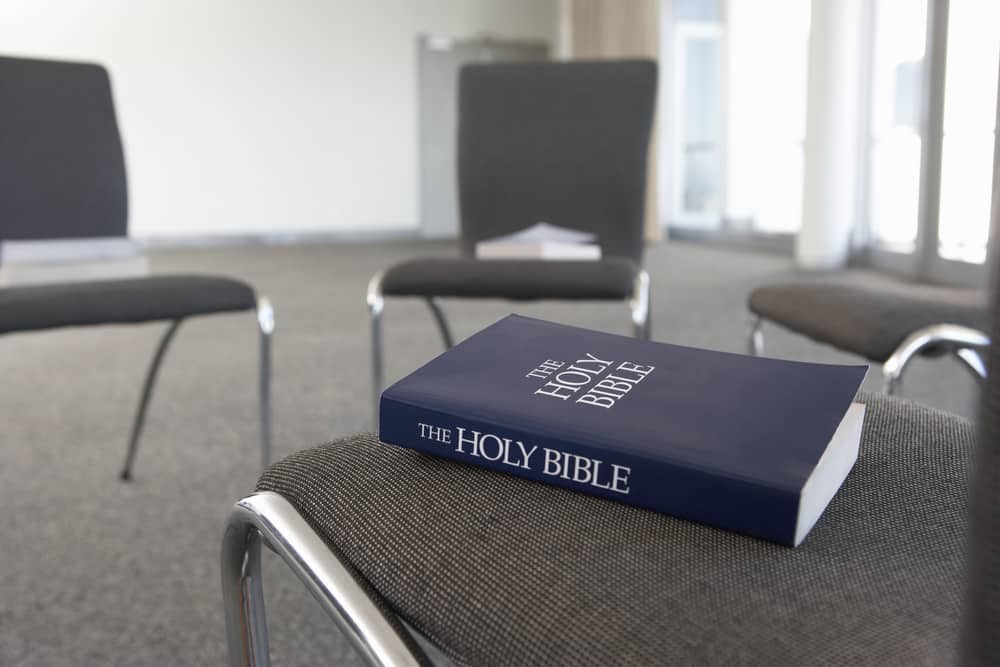
Bible Study Problem #5 – Suitability for Serious Study
I can tell how intensely a book has been studied or is currently used, by the markings in that book.
When I am reading I always have a pencil and a highlighter nearby. In fact, this is what students are taught to do when seriously studying a text for comprehension.
Highlighting is good, but writing notes and thoughts in the margins is the most effective strategy for reading comprehension and engaging with the text. You can highlight and create notes in most electronic book formats but it is much harder and not as integrated when one is reviewing the text.
Not only do we want our students to be reading from a print Bible, but we want it to be a Bible that is their own.
They need to study with a personal Bible that they are comfortable enough to write in. Yes, the Bible is holy. Certainly, it is to be treated with respect.
More importantly, it is meant to be used, studied, and loved.
We are not desecrating our Bibles when we write thoughts, insights, and notes in it. In fact, we are honoring the Bible when we engage with it in serious, diligent study.
Any serious student to the Bible will tell you that a single passage can be studied again and again with new insight each time.
Sadly, we walk away from our time in the word and the worries of the world quickly cause us to forget what we have learned. Writing down the insights and applications that God gives us in study help those lessons to stick with us.
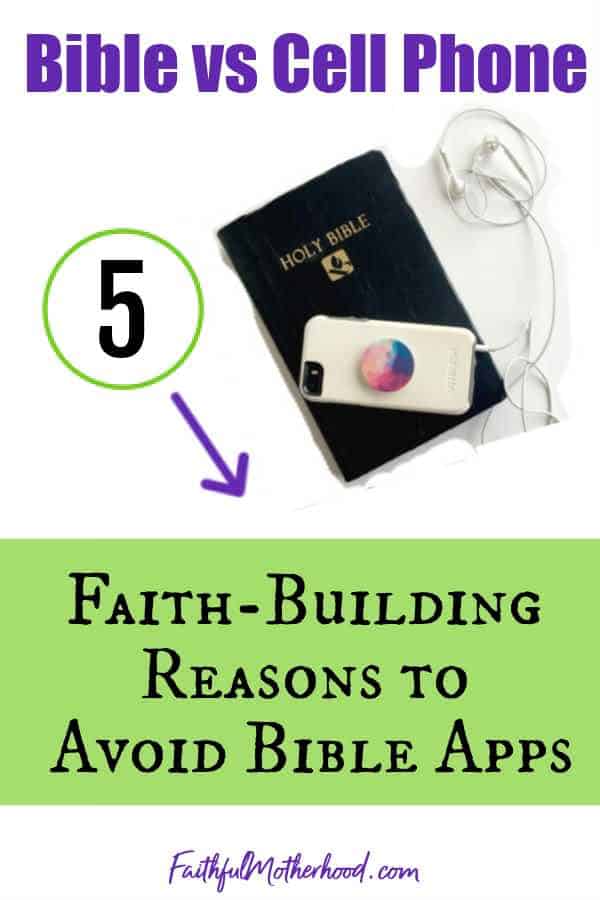
Bible vs Cell Phone Solution
The solution to the struggle between using a cell phone vs the Bible is to put down the Bible app, get a print Bible, and start taking notes in it.
Bible apps have their time and place. They are a convenient way to always have the Bible with us.
Nevertheless, when it is time to study the Bible – put away the phone and pick up a printed Bible. You and your child will spend more time in the Bible and will understand more of what you are reading.
The goal of reading the Bible is not to say that we have done it. The goal of Bible reading is “to be transformed by the renewing of your mind” and to develop a heart after God’s own heart.
May we study the Bible as the precious gift from God that it is.
Do you use a Bible study app? Do you prefer it or your print Bible?

The voice behind FaithfulMotherhood.com is Jyn. She is a veteran homeschool mom of three. More than just a pastor’s wife, she holds a Master of Divinity degree and has served in church leadership for over 20 years. Her passion is equipping parents to live out their calling as the number one faith influencer for their children. She longs to see moms empowered by God’s Word and transferring that love to their children through daily Bible study and family devotions.





